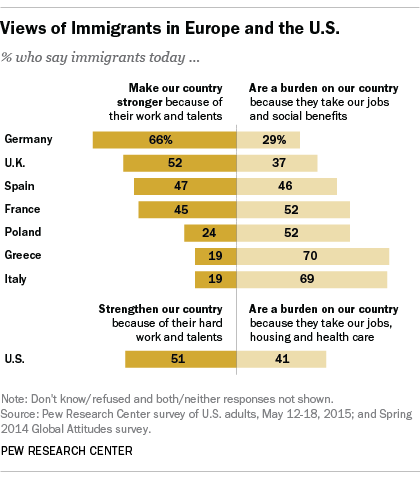Migration and terror: time for a sensible debate?
Stay up to date:
Migration
It would be easy to conclude that migrants and migration are key drivers of the new fragility, in all its guises. There is a rising discourse that migrants may threaten national security, exacerbated by recent terrorist outrages in Paris and San Bernardino. Migrants are regularly blamed for growing unemployment. Migration can place new burdens on already overstretched social services, generating growing social discontent. Migration lies at the heart of some of the extremes that are increasingly becoming normalized in political debates, exemplified by Donald Trump’s sustained popularity.
On the whole this conclusion would be wrong, and there is very little evidence to support many of these assumptions. But we do need to recognize that in certain circumstances, migration does pose a challenge and migrants may become a threat. As research on attitudes to migration has shown, public opinion varies greatly on this subject. Unfortunately, the space for a reasonable debate on migration is shrinking – another characteristic of a fragile, fractured, frustrated world.
A far more substantive conclusion is to understand mobility and migration as a consequence, not a cause, of the new fragility. One in three Syrians have now left their homes, and many of them are either already in Europe or heading there. Many of the asylum seekers arriving in Europe and elsewhere are not fleeing conflict and persecution, but are fleeing fragility as manifested in a lack of jobs, welfare and hope. Most of them are transported by migrant smugglers – the normalization of illegality is another symptom of a fragile world, governed by outdated institutions, laws and norms, and without effective policies to manage change.
The scale of migration will almost certainly continue to grow. Becoming accustomed to mobility will be an important aspect of becoming accustomed to the new fragility. Already one in 33 people across the world are international migrants, moving in response to global disparities in development, demography and democracy. That proportion will increase as the effects of climate change take hold on vulnerable people: it has been predicted that hundreds of millions of people may flee the effects of climate change this century. Around one in seven people are already internal migrants, moving to cities that will be the fulcrum for the opportunities and challenges of the new fragility.
For there will be opportunities, and migration can help realize them. First, migrants and diasporas can help address some of the extremes of a fragile world, by sending remittances and transferring less tangible assets to help stabilize fragile states and post-conflict environments. The Syrian diaspora has strong solidarity ties with refugees in Jordan, Lebanon and Turkey, as well as communities at home. Second, migrants promote development. In 2015 it is expected that migrants will send home about $400 billion, usually to poor countries and often to the direct benefit of local, regional and national economies. The scale of remittances worldwide will continue to grow. Migrants have been acknowledged as a key dynamic in the new Sustainable Development Goals. Third, migration drives the growth of global cities, promotes multiculturalism and results in diversity. These are not without their challenges, but they represent exciting manifestations of a hyperactive world.
In the new global context, more people, with more diverse backgrounds, will come into unprecedented contact with one another. For many, this is a cause for concern. But mobility is as much a norm as fragility, and we need to find ways to accept it, manage it, and benefit from it.
Have you read?
Which countries view immigration most favourably?
How migration can help fight violent extremism
Author: Khalid Koser, Executive Director, Interim Secretariat of the Global Community Engagement and Resilience Fund (GCERF). Chair of the World Economic Forum’s Global Agenda Council on Migration.
Image: Macedonian policemen try to keep refugees and migrants under control at the Greek-Macedonian border. REUTERS/Yannis Behrakis
Don't miss any update on this topic
Create a free account and access your personalized content collection with our latest publications and analyses.
License and Republishing
World Economic Forum articles may be republished in accordance with the Creative Commons Attribution-NonCommercial-NoDerivatives 4.0 International Public License, and in accordance with our Terms of Use.
The views expressed in this article are those of the author alone and not the World Economic Forum.
Related topics:
Forum Stories newsletter
Bringing you weekly curated insights and analysis on the global issues that matter.
More on Resilience, Peace and SecuritySee all
Benjamin Denis and Justine Roche
April 30, 2025
Dave Neiswander
April 28, 2025
Shoko Noda
April 23, 2025
Daniel Mahadzir and Natasha Tai
March 21, 2025
Robert Muggah
March 10, 2025





